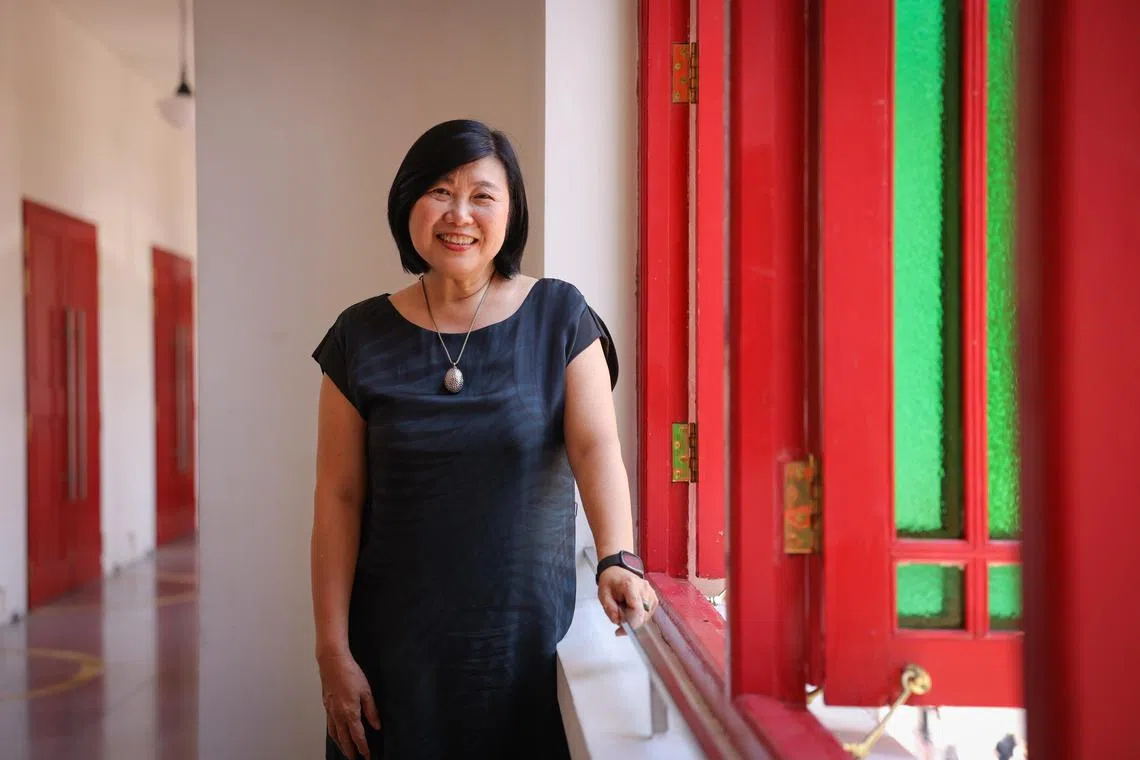Arts House Group: New name, new era for arts and writers festivals?
Sign up now: Get ST's newsletters delivered to your inbox

Executive director Sharon Tan says the Arts House Group is committed to increasing the budget for arts programming and cutting marketing expenses.
ST PHOTO: ONG WEE JIN
Follow topic:
- Arts House Limited is changing its name to Arts House Group to clarify its identity as both venue manager and arts programmer, differentiating it from the venue The Arts House at the Old Parliament.
- AHG's arts programming budget hovers at around $4 million; the group aims to increase this budget and cut marketing expenses.
- AHG seeks to boost fund-raising for new programmes and venue maintenance, while supporting artists through affordable spaces.
AI generated
SINGAPORE – The Arts House Limited (AHL) will be renamed the Arts House Group (AHG).
The change is part of an overall strategy to boost the entity’s profile and cement its identity as both venue manager and arts programmer, says executive director Sharon Tan.
“The front-facing name is important. It has to stand for what we do and who we are. It is not frivolous. Part of it is also to differentiate us from The Arts House at the Old Parliament because the confusion really kills us,” Ms Tan adds.
AHG is often conflated with the venue The Arts House at the Old Parliament, which it runs.
The group manages five other venues: Victoria Theatre and Victoria Concert Hall; Drama Centre; Goodman Arts Centre; Aliwal Arts Centre; and Stamford Arts Centre.
It is also responsible for organising two national flagship festivals: the Singapore International Festival of Arts (Sifa) and Singapore Writers Festival (SWF).
The Arts House, christened as such in 2004 after a $15 million renovation, last went through a major revamp in 2014 when it merged with Arts Festival Limited.
Over the years, it has struggled to find an identity and niche in an increasingly crowded and sophisticated arts landscape.
The merger with the arts festival came on the heels of a report by a 17-member committee convened by the National Arts Council (NAC) to review directions for the then-floundering festival.
It was meant to offer the festival more independence to programme and a base of operations in the heart of the city to engage audiences all year round.
The implementation of this vision has been patchy, interrupted by the Covid-19 pandemic as well as the unexpected death in 2022 of executive director Tan Boon Hui only a year after he was appointed.
Funding is a central concern. According to the AHG’s annual report for the financial year 2023/24, its arts programming budget dipped from $6.2 million from the previous financial year to $4.26 million. This amount covers not just the tentpole festivals, but also all other venue programmes, such as the Aliwal Urban Arts Festival, SingLit-centred Verse and Goodman Open House.
Before the merger, the arts festival’s budget hovered around the $8 million mark. The inaugural Sifa organised by AHL received $6.4 million in government funding and about $1.6 million in private sponsorship.
Ms Tan says the current arts programming budget “is direct programming costs and does not take into account manpower and other costs”.
The group’s programming costs have held steady at around $4 million for several years, but FY2022/23 saw a jump to $6.2 million because of a busted budget.
AHG’s overall expenses totalled $35.63 million for FY2023/24, with headcount ($12.4 million) and building upkeep ($8 million) taking the biggest bites of the pie.
The report also recorded marketing and publicity expenses totalling $2.06 million – a dip from FY2022/23’s $2.8 million, but nonetheless substantial when compared with the arts programming budget. Ms Tan says publicity expenses included in-kind sponsorship from outdoor advertising company JCDecaux, which bumped up the numbers.
The 59-year-old adds that AHG is committed to increasing the budget for arts programming and cutting marketing expenses. “It’s very clear in my mind. There is synergy in what we do – programmes and venues. Corporate function is always as a support to what we do as core business. So, that’s why we are directing budgets to both programmes and to upkeep our buildings – that’s actually expensive.”
The group’s rental income received an almost $600,000 boost, from $1.5 million in FY2022/23 to $2.1 million in FY2023/24 from 13 commercial tenants in its venues.
But this is insufficient to fund all that AHG wants to do.
There is now a two-man fund-raising team. It has found a sponsor to support AHG’s new Next Stage programme, which commissions works in progress by artists and groups residing at its arts centres. Another donor has stepped in to support the maintenance of the Victoria Clock Tower. Other initiatives include campaigns for donors to buy seats or naming rights at the venues.
After 1½ years at the helm, Ms Tan, whose arts administration career started at the Substation in the 1990s,
Hence, initiatives such as the Arts House Literary Fellowship programme, which dovetails with SWF, and the memorandum of understanding with the University of the Arts Singapore, which offers students intern opportunities in the arts industry.
Currently, AHG houses some 200 artists and groups in its three arts centres.
Ms Tan says: “The key for me for all the venues is that we keep it well, we increase utilisation, we make it affordable for the artists. More importantly, we manage it like a community, like a creative enclave.”
This is similar to Mr Tan’s vision of a programming through train for creatives
But making Sifa world-class is going to take more than just funding. AHG is still subject to arts licensing, and the idea of exempting it has been floated since 2015. Ms Tan says she is not pursuing an exemption because that would mean AHG would have to build in-house capability.
She is focused instead on the possibility of hiring associate artistic directors for Sifa, which will allow programmes to be commissioned further upstream.
One long-time complaint from Singapore artists is that festival works have too short an incubation period. Having a festival director come on board earlier will ease that hurdle and hopefully produce more thoughtful and rooted works for the festival.
AHG, despite being an arm’s length from NAC, is still accountable to its paymaster as a mostly publicly funded entity.
Ms Tan says: “Space is so important. It’s not just physical space, it’s metaphorical space. Space for creative expression is important. But it’s a negotiated space. That’s the reality.”


